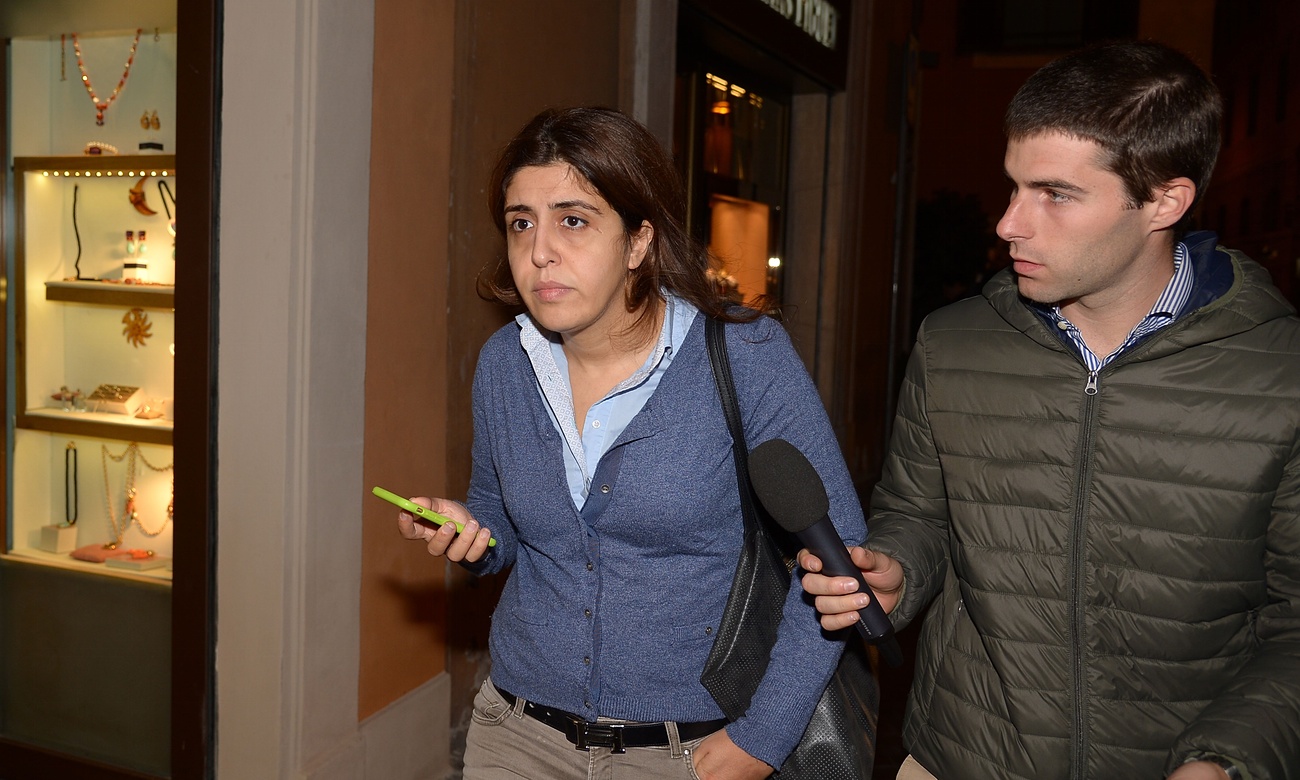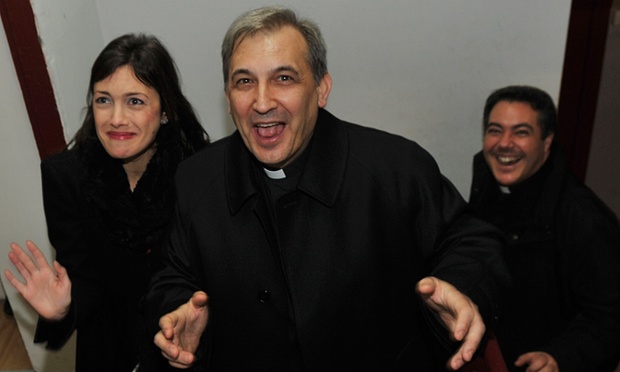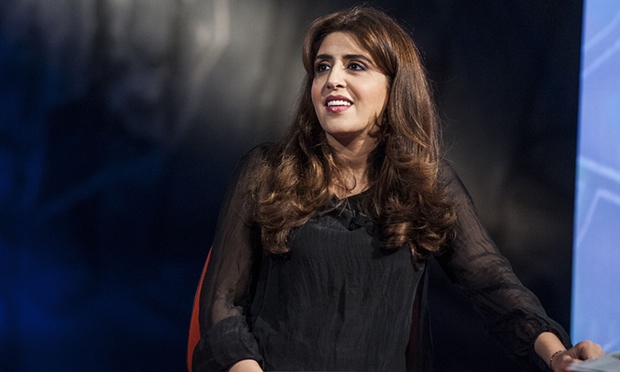Ready for Jail, the Woman at the Heart of the Latest Vatican Scandal
By Stephanie Kirchgaessner
When Francesca Chaouqui was summoned two months ago to a meeting with Vatican police, the public relations expert – who had served on a prominent Vatican commission examining financial reforms – willingly went along. She assumed it would be an hour-long affair. Instead, the 33-year-old was arrested, interrogated and held for 72 hours within the Vatican walls – apart from a short stint in hospital after falling ill – and says she was denied access to a lawyer. “I was wearing very light clothing because I had been at home, and I stayed in those clothes for three days,” she told the Guardian in a recent interview. Since then, having been charged by Vatican prosecutors with leaking confidential documents to two journalists, a crime under Vatican law punishable by up to eight years in prison, Chaouqui has emerged as an unlikely protagonist in the biggest scandal to rock the Vatican under Pope Francis. At the centre of the case are allegations that Chaouqui and two others stole documents they had gathered in the course of work on the Vatican commission and leaked them to journalists who used them to write explosive books about alleged financial mismanagement of church funds. The pope himself has suggested Chaouqui was lashing out at the church because she had not been offered a permanent position after the commission she served on was disbanded. In Italy, where the story has created a media sensation, Chaouqui has been portrayed as an opportunistic temptress, a “sex bomb” who allegedly seduced a Spanish monsignor who served with her on the commission, and then convinced him to betray the church and leak the documents to the two journalists, Gianluigi Nuzzi and Emiliano Fittipaldi. The portrayal of Chaouqui, who had previously worked at the international law firm Orrick, Herrington & Sutcliffe and accountancy firm Ernst & Young, as a seductress was propelled in part by a picture of her and her husband that has circulated online. It is not graphic but appears to show both to be nude, with him playfully biting her shoulder. Her shoulders hunched and with dark circles under her eyes, Chaouqui cut a far different figure in her interview with the Guardian from the one that has emerged on the front pages of Italian newspapers. Flanked by her well-known defence lawyer, Giulia Bongiorno, the devout Catholic came across as a wounded – if self-proclaimed – martyr who insists she is innocent of all the allegations but is willing to go to jail if the Vatican court finds her guilty. “I took an oath of loyalty to that state, and that means accepting their rules, even if they are wrong. It’s a monarchy, it’s not a liberal state,” she said. “The pope is not just a head of state, he is the head of my religion, he is God on Earth. If they find that I am guilty, I must go, I have no choice.”
So far, the Vatican has not released any evidence in its case against Chaouqui or her co-defendants, the Spanish monsignor Lucio Angel Vallejo Balda, a layperson named Nicola Maio, and the two journalists, who are all being tried together. But in Italian press reports, Balda has alleged that he was seduced by Chaouqui – who he also said told him she was a secret agent – and that he leaked the documents after being encouraged to do so. Chaouqui denies they ever had sex, and indicates the suggestion is the most ludicrous thing she has ever heard. “It was friendship, closeness, confidence but nothing more,” she said. She does admit, however, that WhatsApp messages between the two included discussions about sex. But she says excerpts published in newspapers have been taken out of context. In one, she offered to introduce the monsignor to a relative, whom she described as “36 years old. Soft.” “Some things are true, for example when I say to Balda, ‘have sex because it’s better for your mind’, that’s true. But it’s in the context of a joke,” she said. “Others are taken out of context.” Bongiorno points out that the statement Balda gave to reporters included “many false things that are the fruit of fantasy” – for instance that Chaouqui was connected to the Chinese mafia. But only one of the allegations was seized upon in press reports: that the two had a sexual relationship. “The collective opinion says ‘we believe in the sex’. But it’s part of a list of things that are fantasies,” Bongiorno said. The attorney also insists other WhatsApp messages that will be used as evidence in the trial have proven Balda had a direct relationship with the journalists in question, without any interference by Chaouqui. Both see other forces at play in the prosecution and vilification of Chaouqui. “I believe that in Italy - not abroad - the fact of being a young woman in a position of power is seen with great prejudice … it often happens that a young woman who may be cute and is in a position of power must have something wrong with her. This case is one of a thousand examples,” Bongiorno said. Asked about the photos of her online, Chaouqui said: “This is a joke with my husband. These were on Facebook before the nomination, I didn’t have the intelligence at the moment of my nomination to close my profile. I had a normal profile and a normal life.” Chaouqui, who is expecting her first child, expresses admiration and respect for the pope. Both she and her attorney see the charges as a response to Chaouqui’s alleged role as a “shield” for him in her work on the commission, though neither offers any examples. The suggestion points to the widely held view that Pope Francis has internal enemies within the church who object to his reform proposals, particularly those that would shed more light on the church’s murky finances. “The trial should not only be framed only as a leaked information trial – there’s also a trial that takes into account the role of Chaouqui, for what she was doing,” Bongiorno said. But that narrative seems to contradict the pope’s own statements. Speaking about the case in November during a press conference on his papal plane, Francis said “a mistake was made” when Balda and Chaouqui were asked to join the papal commission. “I think I am right in saying that it was [Balda] who said she was someone who was well acquainted with the world of business relations. They worked and when the work was complete, [other commission] members kept some positions in the Vatican. Mrs Chaouqui did not stay in the Vatican: some say she was angry about this,” Francis said.
Chaouqui says she does not know why she was nominated to join the commission back in 2013, and denies that strings were pulled on her behalf. “I am Catholic so it’s clear, if the pope calls you, you don’t ask too many questions. I made a mistake. It was a big error [to join the commission]. I should have asked myself more questions, especially to understand legally what was happening to me, because my position as an Italian citizen that has a state secret in another state is not a simple thing,” she said. She called the Vatican a “sacred monster”, meaning it is untouchable. Among aspects of the case that confound Bongiorno are the Vatican’s alleged repeated violations of Chaouqui’s due process rights, first by interrogating her without an attorney, by forbidding Bongiorno from defending her in the trial – she has been given a Vatican attorney instead – and by allegedly failing to put forward any documentary evidence against her client. Bongiorno insists that there are several grounds under which she could contest the validity of the trial if found guilty. A person who is convicted under Vatican law is supposed to be held in an Italian jail, but it is far from clear that Italy would co-operate in this case. When pressed to explain why she would not fight a possible jail sentence if found guilty – she and Bongiorno disagree on whether she would even appeal – Chaouqui said: “If Jesus had gone away from [Pontius] Pilate’s judgment, what would have happened?” Bongiorno then interjected. “Don’t say these things, otherwise they’ll say you are comparing yourself to God. In any case, let’s just say she knows scripture by heart, so she cites it whenever she speaks,” she said.
|
.
Any original material on these pages is copyright © BishopAccountability.org 2004. Reproduce freely with attribution.


